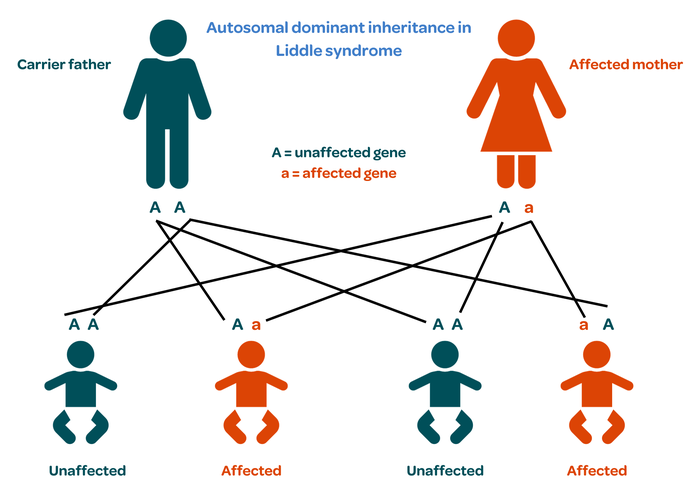What is Liddle syndrome?
Liddle syndrome is a rare genetic condition that causes the body to retain too much salt. This can cause high blood pressure (arterial hypertension), which can eventually lead to kidney damage.
It is named after Dr Grant Liddle who first identified the condition in 1963.
It is not currently known how many people are affected by Liddle syndrome. So far, fewer than 80 families in the world have been diagnosed. However, people may not develop symptoms for many years so the actual rate may be far higher.
Males and females are affected equally.
What are the signs and symptoms of Liddle syndrome?
Most people with Liddle syndrome do not have any symptoms. For those who do, common symptoms include:
- headaches
- blurred vision
- frequent nose bleeds
- breathlessness
- slow growth in children.
These symptoms may be mild at first but get worse and more noticeable over time. The symptoms are all related to high blood pressure, which makes Liddle syndrome hard to diagnosis.
What causes Liddle syndrome?
Liddle syndrome is a genetic condition that is caused by a mutation in one of three genes – SCNN1A, SNCC1B or SCNN1G. These genes control the amount of salt around the body. When any of these genes do not work properly, too much salt is retained in the body, which then causes too much water to be reabsorbed from the urine. Over time the increased amount of water in the blood vessels increases blood pressure, which damages the kidneys.
How is Liddle syndrome diagnosed?
High blood pressure is rare in people under the age of 40. It may be noticed during a routine health check, which can then lead to further investigations.
Liddle syndrome is usually first diagnosed in teenagers or young adults by a blood test than can check levels of the hormones renin and aldosterone. Urine tests can monitor kidney function and blood pressure will be monitored carefully.
Genetic testing may also be available if there is a family history of high blood pressure and/or kidney problems.
Does Liddle syndrome affect other parts of the body?
Without treatment, high blood pressure can increase the risk of having a stroke or developing heart disease.
Does Liddle syndrome run in families?
Liddle syndrome is a genetic condition so it can run in families. It is inherited from one generation to the next in a pattern known as autosomal dominant inheritance.
Everybody has two copies of the genes involved, one from each parent.
Healthy people have two normal copies.
People with Liddle syndrome have one normal and one faulty gene. One copy of the faulty gene is enough to cause the condition.
There is therefore a one in two chance that a parent with Liddle syndrome will pass the condition onto their child.
When a person is diagnosed with Liddle syndrome, it is important that their family members, including any children, have their blood pressure checked to see if they are also affected.
Liddle syndrome can affect family members in different ways, because other factors like diet and lifestyle can also affect blood pressure.

How is Liddle syndrome treated?
There is currently no cure for Liddle syndrome, so treatment focuses on lowering blood pressure to reduce the complications it can cause.
Medications are likely to be prescribed to help lower blood pressure. People with Liddle syndrome may not respond very well to standard blood pressure medications such as angiotensin-converting enzyme (ACE) inhibitors. Amiloride may therefore be prescribed, which is a type of diuretic (water tablet), that stops the kidneys reabsorbing too much salt.
Dietary changes are also likely to be recommended, as people with Liddle syndrome should follow a low-salt diet. This should only be undertaken with advice and monitoring by a specialist kidney dietitian.
Lifestyle changes may also be recommended, including doing regular exercise and stopping smoking.
Liddle syndrome requires lifelong monitoring and treatment, but kidney failure is very unlikely to occur. People with Liddle syndrome can therefore life a full and active life and dialysis or a kidney transplant are very rarely needed.
Where can I get more information or support about Liddle syndrome?
We are not aware of any UK-based support groups for Liddle syndrome. If you know of any Liddle syndrome patient groups, please let us know so we can share their details.

Publication date: 11/2023
Review date: 11/2026
This resource was produced according to PIF TICK standards. PIF TICK is the UK’s only assessed quality mark for print and online health and care information. Kidney Care UK is PIF TICK accredited.